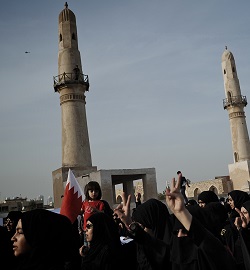The United Nations (U.N.) Office at Geneva released a statement yesterday from Heiner Bielefeldt, the Special Rapporteur on freedom of religion or belief, urging the Government of Bahrain to end its persecution and harassment of senior religious leader, Hussain al-Najati, and expressing grave concerns at this religiously motivated discrimination against the cleric.
The Special Rapporteurs are appointed under the special procedures of the United Nations Human Rights Council with mandates to report and advise on human rights from a thematic or country-specific perspective. The mandate for the Special Rapporteur on freedom of religion or belief is to identify existing and emerging obstacles to the enjoyment of the right to freedom of religion or belief and present recommendations on ways and means to overcome such obstacles. Special Rapporteurs must be invited to a country before being allowed entry. No Special Rapporteurs have been to Bahrain since 2006, and the Special Rapporteur on torture and other cruel, inhuman or degrading treatment or punishment, Juan Mendez, has had his invitation effectively canceled by the Government of Bahrain twice since then.
Mr. Bielefeldt expressed concern regarding the Bahraini government’s “unjustified restrictions on Mr. Najati’s fundamental human rights, including his right to practice and profess peacefully his religious belief.” Najati was born in Bahrain but had his citizenship revoked and was deported out of the country yesterday for “unclear activities”. Mr. Bielefeldt also stressed that “[t]argeting the most senior and influential Shi’a religious figure in Bahrain may amount to intimidating and thus discriminating against the entire Shi’a Muslim community in the country because of its religious beliefs.”
Religious freedom violations against Shi’as in Bahrain have been occurring for decades. The intensity of such attacks greatly escalated following the pro-reform protest movement of 2011, the most recent incident being the disbanding of the Ulama Islamic Council earlier this year. Demolition of Shia religious sites, late-night house raids on religious leaders, and discrimination in hiring practices based on religious preference are tactics frequently used by the Government of Bahrain to inhibit its majority Shia population from gaining influence. The majority of the more than thirty religious sites that were destroyed in 2011 have yet to be rebuilt.
ADHRB calls on the Government of Bahrain to allow the United Nations Special Rapporteur on religious freedom, as well as the Rapporteur on Torture and others, entry into Bahrain in order to investigate and assess ongoing human rights violations in the country. We also call on the international community to pressure the Bahraini government to address violations of religious freedom and other fundamental human rights.
–
Saman Naquvi is ADHRB’s Grassroots Advocacy Associate





